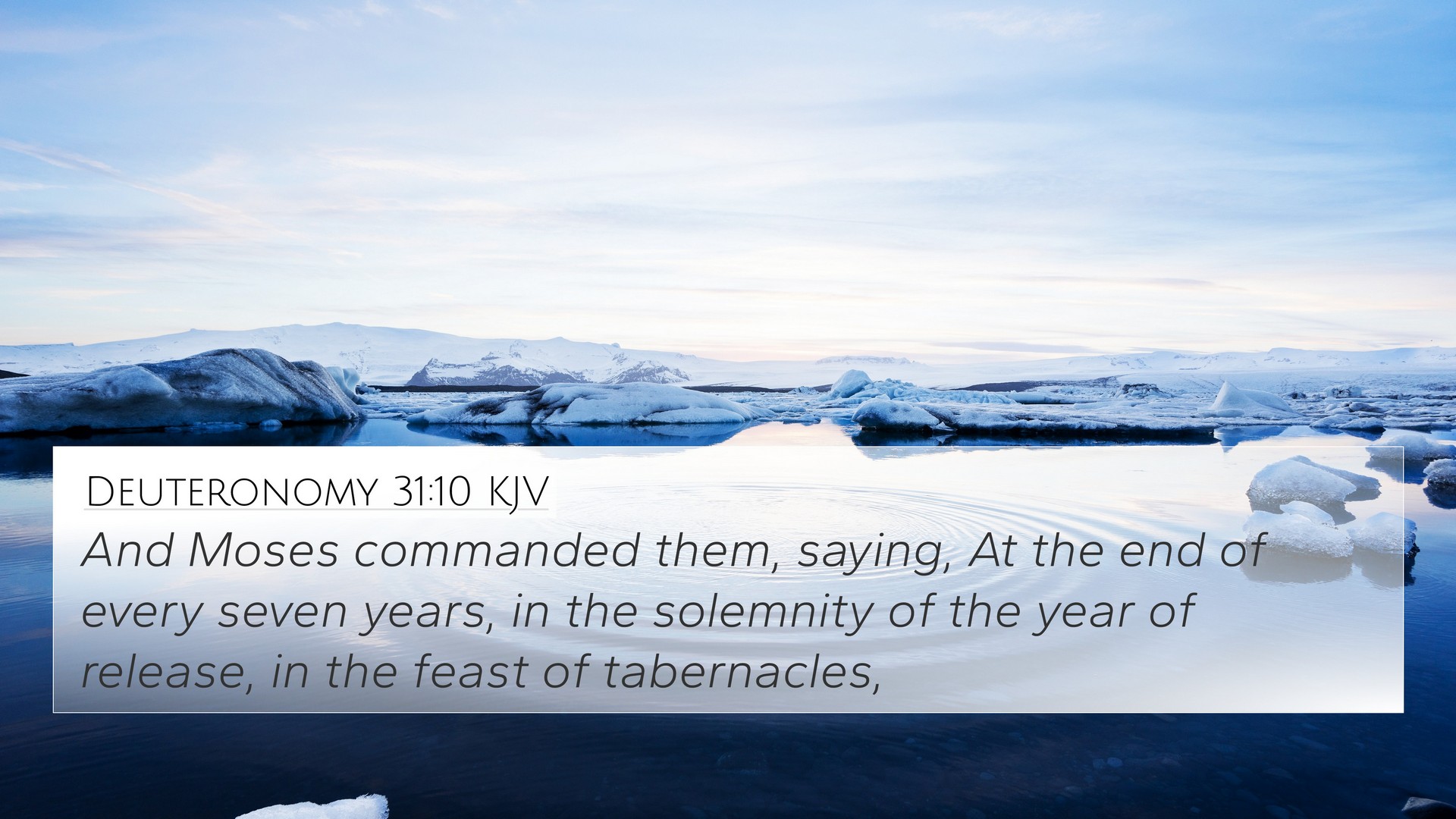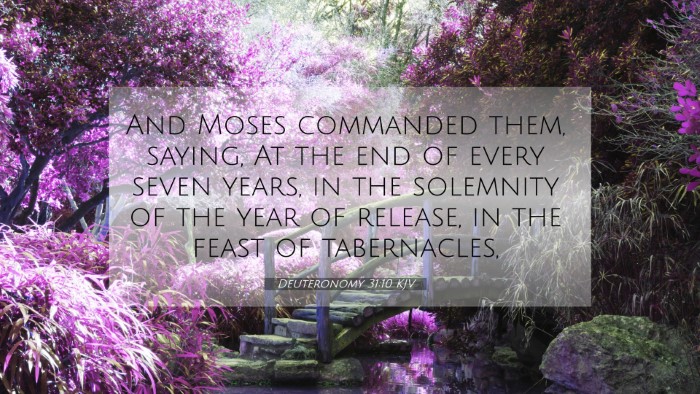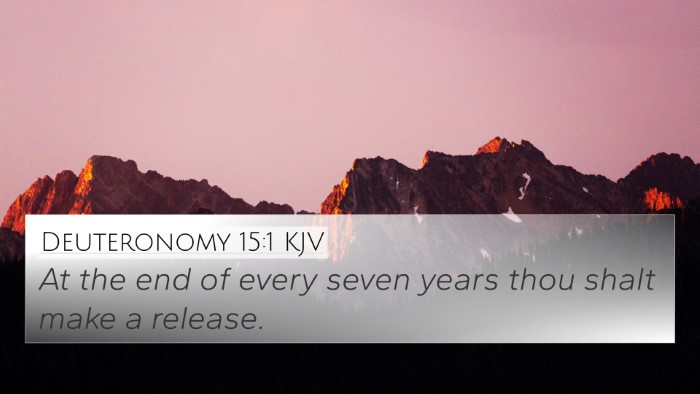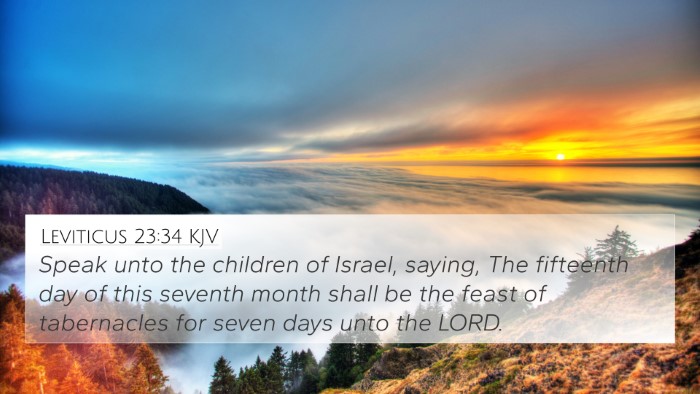Understanding Deuteronomy 31:10
Verse: Deuteronomy 31:10 - "And Moses commanded them, saying, At the end of every seven years, in the solemnity of the year of release, in the feast of tabernacles,"
Summary of Insights
This verse serves as a pivotal directive given by Moses to the Israelites, emphasizing the importance of observing the year of release and the Feast of Tabernacles. It incorporates principles of rest, reflection, and redemption within the covenant community.
Thematic Context
1. Year of Release: The concept of the year of release is rooted in God’s instructions for the Israelites to free debts and restore freedom to those in servitude every seven years. This underscores the theme of mercy, grace, and community care.
2. Feast of Tabernacles: Known as Sukkot, this festival celebrates God’s provision and presence during the Israelites’ wilderness journey. It reflects gratitude and remembrance of God’s guidance and grace.
Commentary Insights
- Matthew Henry: Highlights the dual purpose of this command: to facilitate a time of communal worship and to prompt individuals to reflect on God's faithfulness and mercy. Henry emphasizes the significance of gathering the people to read the law, encouraging adherence to God's commandments.
- Albert Barnes: Points out that the observance of this command served as a reminder of the covenant status of Israel, prompting them yearly to reflect on their obligations to God and each other. Barnes mentions that the reading of the Law every seven years plays a critical role in educating the people about their history and relationship with God.
- Adam Clarke: Emphasizes the cultural and spiritual ramifications of such observances and the necessity for periodic renewal of commitment to God’s law, fostering both individual and communal spirituality. Clarke also notes the importance of inclusivity in these gatherings, as they are open to all, encouraging community unity.
Cross-References
Deuteronomy 31:10 connects to several significant Bible verses, offering a deeper understanding of its themes:
- Leviticus 25:10: Discusses the year of Jubilee and economic restoration, reinforcing themes of freedom and renewal.
- Deuteronomy 15:1: Details the year of release, providing context for debt cancellation and mercy.
- Exodus 23:14-17: Outlines the three yearly feasts, which encompasses the significance of the Feast of Tabernacles.
- Nehemiah 8:10-12: Describes the reading of the Law during the Feast of Tabernacles, aligning closely with the instructions of Deuteronomy.
- Psalm 119:105: Emphasizes the importance of God’s law as a guide, which is central to the observance commanded in this verse.
- Matthew 5:17-19: Jesus’ teachings about the law underscore its enduring relevance and the importance of keeping the commandments.
- Hebrews 10:24-25: Encourages believers not to neglect gathering together for worship, reflecting the spirit of communal observance seen in Deuteronomy.
Learning Points from Deuteronomy 31:10
- Community Gathering: This verse illustrates the importance of regular, communal worship as a means of reinforcing spiritual truths.
- Remembrance and Gratitude: The connection to the Feast of Tabernacles invites reflection on God's goodness and provision.
- Covenantal Responsibilities: Emphasizing that observances are not merely ritualistic but are tied to their identity as God's people.
- Reflection on God’s Word: Regular reading and engagement with Scripture fosters a deeper connection with God and understanding of one’s role in the community.
Practical Application
Understanding Deuteronomy 31:10 can enrich one’s faith journey by:
- Encouraging participation in community worship and observance of religious traditions.
- Cultivating a spirit of thankfulness and celebration of God's blessings.
- Promoting discussions on how to implement rest and reflection periods in one’s life.
- Engaging in dialogue about the significance of scripture in modern worship settings.
Conclusion
Deuteronomy 31:10 serves as a vital reminder of the necessity for community engagement, the importance of remembering God's covenant, and the diligence required in teaching God’s laws. By exploring the connections between this verse and others, believers can gain a richer understanding of their faith and the traditions that shape it.




